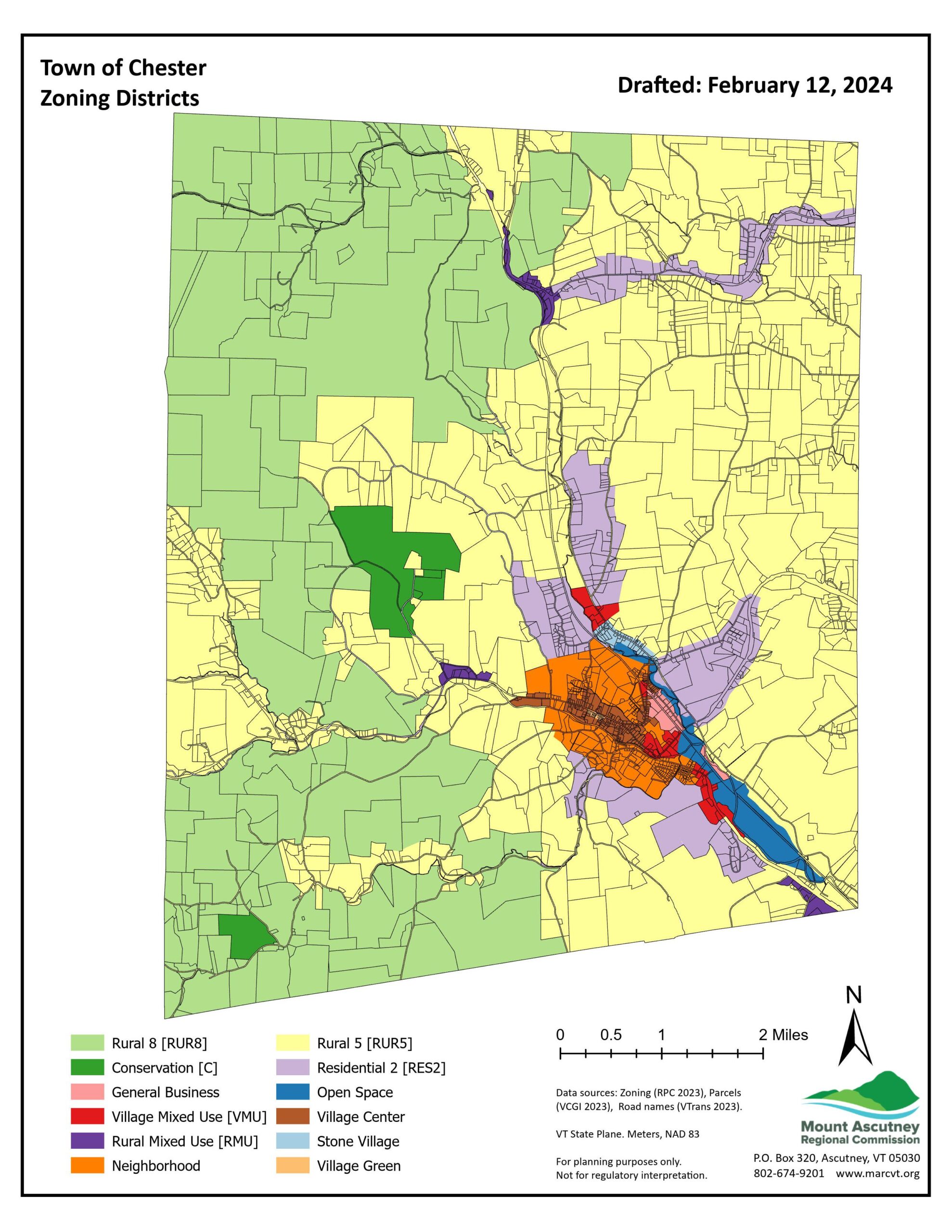
CHESTER, Vt. – The Chester Selectboard met on Wednesday, Nov. 6, turning their attention to the ongoing discussion of revising the Unified Development Bylaws for the town’s rural districts, currently called the R-120 and Conservation-Residential districts.
At the previous selectboard meeting, the board had been met with resistance from Chester residents to adoption of the planning commission’s proposed changes. The change most objected to by those present was the shift from minimum lot sizes to density-based zoning, which would allow smaller lots, but would specify maximum overall density within the zone. Due to the feedback received, as well as several letters from residents submitted to the board in the interim, the planning commission had elected to abandon the density-based approach, but wanted the selectboard to provide them with guidance as to what they would like to see in any future proposed revisions.
Much of the discussion this time around focused on a narrow strip along Route 10 and part of Trebo Road, which the proposed new zoning map would remove from the current R-120, and place into the new Residential-2 zone. This would change the minimum lot size in the zone from three acres to two acres, as well as removing a number of conditional uses. The proposed map and bylaws document can be found at www.chestervt.gov/rural-district-bylaw-update-public-hearing-7222024.html.
Planning Commission Chair Hugh Quinn argued that the changes were made to reflect the reality on the ground in the area in question, telling the board that, “The lot size reduction was a byproduct of the reality of what that part of town looks like…lots are not very big, and it’s largely residential.” Due to that area of town having been subdivided prior to the town’s adoption of zoning in the 1970s, Quinn told the board that two-thirds of the lots included in the new zone are already under the current three-acre minimum, what town planning and zoning administrator Preston Bristow called “preexisting nonconforming lots.”
Quinn emphasized that the minimum lot size reduction was not the only proposed change, but that the removal of conditional uses was intended to reflect the more residential nature of the area. Uses removed from the area in the proposal include extraction operations, heavy construction, sawmills, wood processing, animal kennels, animal hospitals, and nurseries. “There might be some people who could create a lot, under the zoning changes, who couldn’t before, but on the other hand, it’s being zoned for uses that are more consistent with [a] residential [area],” said Bristow.
Chair Arne Jonynas agreed with the change, saying “I’m okay with keeping Route 10 and Trebo [as they are in the proposal].”
Selectboard member Peter Hudkins felt that the proposed name change from “Conservation-Residential” to “Rural 10-acre” was objectionable. Based on his work as a developer, Hudkins said, “Once you take ‘conservation’ out of a name, you find that [that area] gets developed way more.” Hudkins felt that this area should remain less developed, saying, “The town gets a lot of use out of it, and a lot of people get a lot of use out of it.” He envisioned a scenario where further development reduces access to trails, streams, and other natural features that make Chester an attractive place to live and visit.
Quinn, in summarizing how he felt the selectboard wanted the planning commission to proceed, said that his understanding was that the planning commission should abandon density-based zoning, revert to three- and five-acre lot minimums, retain “conservation” in the name of the C-R zone, and otherwise leave other proposed changes intact. A new hearing will need to be held for the revised proposal in the future, once the planning commission has altered the proposed bylaws in response to the direction the selectboard has provided.
The board also discussed Chester’s remaining ARPA funds, which need to be allocated by the end of the year. Town manager Julie Hance suggested to the board that, in order to utilize the funds, they allocate the remaining $157,750.83 to the ambulance purchase for which the town had already bonded. This would make use of the remaining ARPA money, while freeing up the same amount for the capital fund, to be used for other projects in the future. Two projects discussed for this money were the solar field purchase, and the repair or replacement of Chester’s aging pool house.
Finally, in their capacity as water and sewer commissioners, the board increased water and sewer rates. The water base rate was increased from $73 to $76, and the use rate was increased from $2.75 to $3 per 1,000 gallons. The sewer base rate went from $110 to $112, and the use rate from $5.25 to $5.50 per 1,000 gallons.
The next Chester Selectboard meeting will be held on Wednesday, Nov. 20, at 6:30 p.m., at the Chester Town Hall.